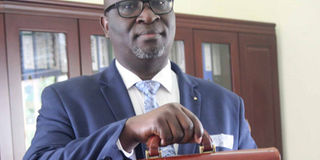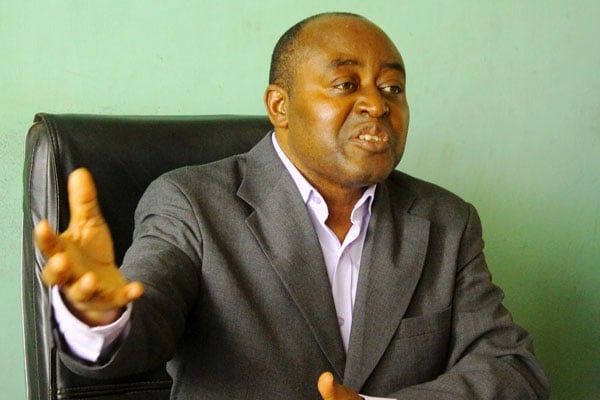Mengo war against graft has paid off, say officials

Results. Buganda Kingdom deputy Katikkiro Waggwa Nsibirwa displays the briefcase containing the kingdom’s financial year 2019/2020 budget at Bulange, Mengo in Kampala early this month. PHOTO BY JOSEPH KIGGUNDU
What you need to know:
- Voluntary donations from the Kabaka’s subjects through campaigns such as Oluwalo Lwaffe (our duty) have contributed significantly to the kingdom’s revenue. The target for this year from the campaign is Shs1b, up from Shs600m last year and Shs200m in 2017.
Kabaka Ronald Mutebi, during his silver jubilee anniversary last year, expressed concern that widespread greed and corruption was pushing Uganda to self-destruction.
To deter the vices in his kingdom, Kabaka Mutebi directed Katikkiro Charles Peter Mayiga to institute the office of the auditor general and create transparent systems to manage the cultural institution’s resources.
As the Kabaka celebrates his 26th coronation anniversary at Nkumba University on Wednesday, his directive has started to pay off.
According to this financial year’s budget figures presented by the deputy Katikkiro, Mr Waggwa Nsibirwa, the kingdom had estimated Shs96b for the Financial Year 2018/19 but this increased by Shs12b.
“The coming of the auditor general, transparency, good financial governance and timeliness has enhanced the image of the kingdom and many development partners are coming to support our projects,” Mr Nsibirwa said in an interview at the weekend.
Voluntary donations from the Kabaka’s subjects through campaigns such as Oluwalo Lwaffe (our duty) have contributed significantly to the kingdom’s revenue. The target for this year from the campaign is Shs1b, up from Shs600m last year and Shs200m in 2017.
The central government, especially the ministry of Agriculture through the Uganda Coffee Development Authority (UCDA) and the Ministry of Health, have also injected money into Mengo.
Kabaka Mutebi’s strategy to improve the socio-economic wellbeing of the Baganda has been structured in three priorities; consolidation and development of culture and heritage; promotion of the kingdom’s health and education sectors, and training health practitioners to promote immunisation campaigns.
Six hospitals are planned in six counties where the oil pipeline will pass. The current planned sector expenditure for education is Shs17b, investments will consume Shs30b, agriculture Shs4.7b, cooperatives Shs4.3b and land management Shs10b.
Buganda’s history dates back to nearly 1,000 years when in the 14th century, King Kato Kintu founded Buganda Dynasty. Between the 18th and 19th centuries, it became one of the most powerful kingdoms in East Africa and in 1894, it became the centre of the Uganda Protectorate becoming the major producer of cotton and coffee. The current administration is desirous to regain the lost glory.
“We must get back to the top. We had been shifted backwards after the 1966 crisis but there is hope that when we unite and participate in development, we will regain our position,” Katikkiro Mayiga said in a recent Lukiiko sitting.
The kingdom is rallying youth to participate in profitable ventures and save through cooperatives such as Pewosa. Buganda Development Foundation is spearheading the growing of potatoes and bananas to boost food security. The kingdom, in partnership with Uganda Breweries Ltd, is also encouraging cassava growing as a raw material for Ngule brew.
“We want financial stability for the kingdom by boosting all our 20 trading diverse media, education and real estate companies. We are also adding another one called Buganda Coffee Ltd,” Mr Nsibirwa said.
In this financial year, two commercial buildings have been planned at Makindye and Kasangati sub-counties.
Mengo’s minister for tourism Kyewalabye Male says they have drawn strategic interventions to earn Shs500b annually from their tourism sites in Lubaga Division. This will be by involving Ugandans in tourism.
The kingdom will rehabilitate cultural sites such as an underground prison facility in Mengo palace, which is said to have been former president Idi Amin’s slaughter house.
Another cultural site, according to Mr Kyewalabye, is Bulange, the kingdom’s administrative centre that was built in the 1950s. Mengo intends to enhance showcasing Bulange’s facilities such as the Lukiiko hall, and the Kabaka’s office, among others.
“It will be a full package where visitors, apart from learning about Buganda history, will also be able to know the number of windows or doors on the block and have a feel of a building that is said to be a look alike of Buckingham Palace in UK,” Mr Kyewalabye says.
The royal mile, a stretch from Bulange to Kabaka’s official residence, Twekobe, at Mengo is also being refurbished to become a tourist site.
As the start point, mark stones will be placed at the start of the mile and a tree commonly known as Kabakanjagala and the totem sculptures that have been modelled from the 52 clans of Baganda will also be on display.
The kingdom has asked all its 52 clans to contribute Shs10m towards instalment of totem sculptures.
“Over the coming year, we will enhance audio messages at each sculpture that will educate the visitors about each of Buganda’s clans. Generally, the aim is to have the royal mile as a one-stop centre that tells everything about the Baganda,” Mr Kyewalabye says.
A museum is already being set up in one of the buildings within the palace. “We also have our first Luganda Bible. We want to display all these in our museum within the palace. Work is in progress,” Mr Kyewalabye says.
Kasubi Tombs have been undergoing reconstruction and they are expected to be completed next year. At Naggalabi, Budo in Wakiso District where Buganda kings are enthroned, cultural houses will be refurbished and literature about each of the leaders will be compiled.



